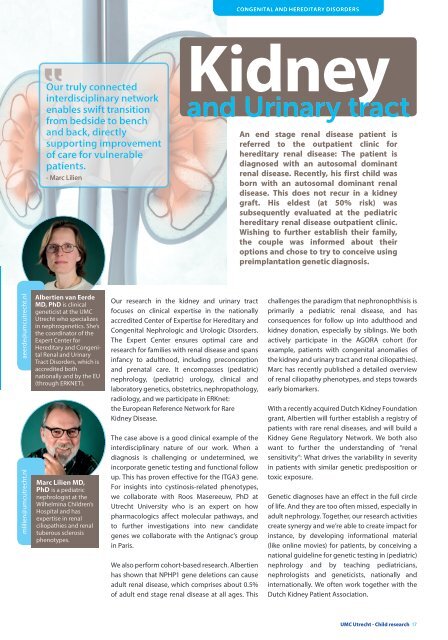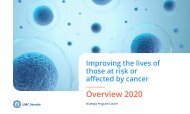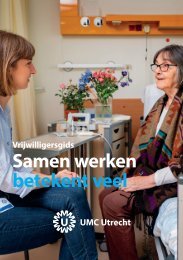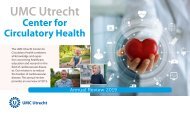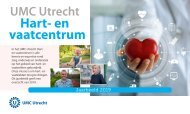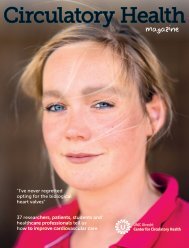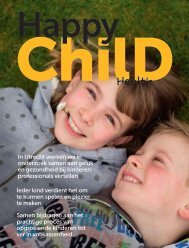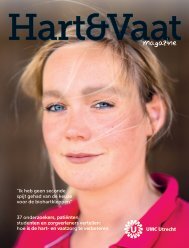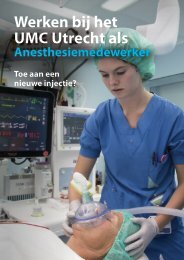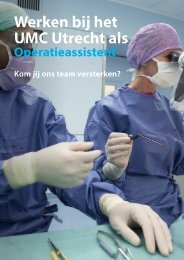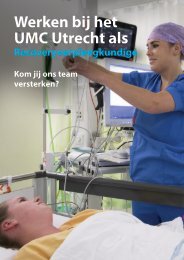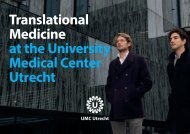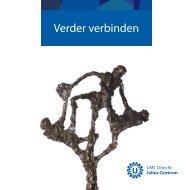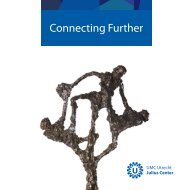Child research
Create successful ePaper yourself
Turn your PDF publications into a flip-book with our unique Google optimized e-Paper software.
CONGENITAL AND HEREDITARY DISORDERS<br />
truly connected<br />
interdisciplinary<br />
Our<br />
network<br />
enables swift transition<br />
from bedside to bench<br />
and back, directly<br />
supporting improvement<br />
of care for vulnerable<br />
patients.<br />
- Marc Lilien<br />
Kidney<br />
and Urinary tract<br />
An end stage renal disease patient is<br />
referred to the outpatient clinic for<br />
hereditary renal disease: The patient is<br />
diagnosed with an autosomal dominant<br />
renal disease. Recently, his first child was<br />
born with an autosomal dominant renal<br />
disease. This does not recur in a kidney<br />
graft. His eldest (at 50% risk) was<br />
subsequently evaluated at the pediatric<br />
hereditary renal disease outpatient clinic.<br />
Wishing to further establish their family,<br />
the couple was informed about their<br />
options and chose to try to conceive using<br />
preimplantation genetic diagnosis.<br />
aeerde@umcutrecht.nl<br />
mlilien@umcutrecht.nl<br />
Albertien van Eerde<br />
MD, PhD is clinical<br />
geneticist at the UMC<br />
Utrecht who specializes<br />
in nephrogenetics. She’s<br />
the coordinator of the<br />
Expert Center for<br />
Hereditary and Congenital<br />
Renal and Urinary<br />
Tract Disorders, which is<br />
accredited both<br />
nationally and by the EU<br />
(through ERKNET).<br />
Marc Lilien MD,<br />
PhD is a pediatric<br />
nephrologist at the<br />
Wilhelmina <strong>Child</strong>ren’s<br />
Hospital and has<br />
expertise in renal<br />
ciliopathies and renal<br />
tuberous sclerosis<br />
phenotypes.<br />
Our <strong>research</strong> in the kidney and urinary tract<br />
focuses on clinical expertise in the nationally<br />
accredited Center of Expertise for Hereditary and<br />
Congenital Nephrologic and Urologic Disorders.<br />
The Expert Center ensures optimal care and<br />
<strong>research</strong> for families with renal disease and spans<br />
infancy to adulthood, including preconception<br />
and prenatal care. It encompasses (pediatric)<br />
nephrology, (pediatric) urology, clinical and<br />
laboratory genetics, obstetrics, nephropathology,<br />
radiology, and we participate in ERKnet:<br />
the European Reference Network for Rare<br />
Kidney Disease.<br />
The case above is a good clinical example of the<br />
interdisciplinary nature of our work. When a<br />
diagnosis is challenging or undetermined, we<br />
incorporate genetic testing and functional follow<br />
up. This has proven effective for the ITGA3 gene.<br />
For insights into cystinosis-related phenotypes,<br />
we collaborate with Roos Masereeuw, PhD at<br />
Utrecht University who is an expert on how<br />
pharmacologics affect molecular pathways, and<br />
to further investigations into new candidate<br />
genes we collaborate with the Antignac’s group<br />
in Paris.<br />
We also perform cohort-based <strong>research</strong>. Albertien<br />
has shown that NPHP1 gene deletions can cause<br />
adult renal disease, which comprises about 0.5%<br />
of adult end stage renal disease at all ages. This<br />
challenges the paradigm that nephronophthisis is<br />
primarily a pediatric renal disease, and has<br />
consequences for follow up into adulthood and<br />
kidney donation, especially by siblings. We both<br />
actively participate in the AGORA cohort (for<br />
example, patients with congenital anomalies of<br />
the kidney and urinary tract and renal ciliopathies).<br />
Marc has recently published a detailed overview<br />
of renal ciliopathy phenotypes, and steps towards<br />
early biomarkers.<br />
With a recently acquired Dutch Kidney Foundation<br />
grant, Albertien will further establish a registry of<br />
patients with rare renal diseases, and will build a<br />
Kidney Gene Regulatory Network. We both also<br />
want to further the understanding of “renal<br />
sensitivity”: What drives the variability in severity<br />
in patients with similar genetic predisposition or<br />
toxic exposure.<br />
Genetic diagnoses have an effect in the full circle<br />
of life. And they are too often missed, especially in<br />
adult nephrology. Together, our <strong>research</strong> activities<br />
create synergy and we’re able to create impact for<br />
instance, by developing informational material<br />
(like online movies) for patients, by conceiving a<br />
national guideline for genetic testing in (pediatric)<br />
nephrology and by teaching pediatricians,<br />
nephrologists and geneticists, nationally and<br />
internationally. We often work together with the<br />
Dutch Kidney Patient Association.<br />
UMC Utrecht - <strong>Child</strong> <strong>research</strong> 17


